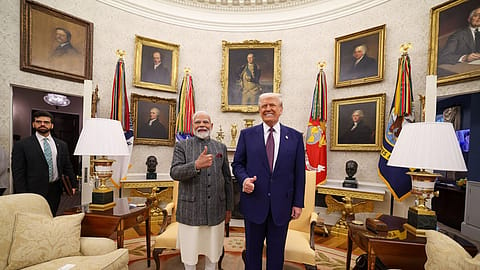Donald Trump bats for more oil and gas exports to India; says U.S. wants 'level playing' field
Donald Trump slammed India for "unfair" tariffs on U.S. goods, saying it is impossible to sell U.S. cars in India because of 70% tariffs.

U.S. President Donald Trump, after meeting with Prime Minister Narendra Modi at the White House, emphasised that the U.S. wants a level playing field to bring down its trade deficit with India, announcing a new energy deal that will pave the way for more oil and gas exports from the U.S. to India.
The energy agreement will make the U.S. the largest supplier of oil and gas to India, Trump said during the joint press conference with PM Modi.
The U.S. President said the two countries will strengthen economic ties and bring “greater fairness and reciprocity” to their trading relationship. “As a signal of good faith Prime Minister Narendra Modi recently announced reductions to India’s unfair and very strong tariffs that limit U.S. access in the Indian market very strongly,” Trump said, calling it a “big problem”.
“India imposes a 30% to 40% to 60% to even 70% tariffs on so many goods and in some cases far more than that. For example, 70% tariffs on U.S. cars going into India make it pretty much impossible to sell those cars. Today, U.S. trade deficit with India is almost a $100 billion,” he said.
Trump said the two leaders have agreed to begin negotiations to address long-running disparities that should have been taken care of over the last four years. “We want a certain level playing field which we thing we are entitled to and he does also in fairness. We are going work on that very hard and we can make up the difference very easily with the deficit with the sale of oil and gas and LNG of which we have more than anybody in the world.”
Trump slammed India for charging the highest tariffs anywhere in the world during his joint press conference with PM Modi. "I don’t blame them. It’s a different way of doing business. It’s very hard to sell in India because they have trade barriers and very strong tariffs. We are right now a reciprocal nation. Whatever India charges, we are going to charge them," Trump said, adding that’s fair for the people of the United States and India.
India's total goods trade with the U.S. was $129.2 billion last year, according to the United States Trade Representative (USTR). In 2024, India exported $87.4 billion worth of goods to the U.S. while the world's biggest economy exported $41.8 billion worth of goods to India. U.S. goods trade deficit with India was $45.7 billion in 2024, a 5.4% increase over 2023.
Recommended Stories
The two leaders also discussed small modular reactors to enhance India’s nuclear energy capabilities. This ground-breaking development will bring tens of billions of dollars to the U.S. civilian nuclear industry, Trump said.
Prime Minister Narendra Modi in his address said that U.S. and India bilateral trade will more than double to $500 billion by 2030 and the two countries will quickly start work on a trade agreement.
Hours before Trump was scheduled to meet the Indian Prime Minister, the White House cited India as an example where U.S. trading partners do not give the world’s largest economy reciprocal treatment. “The U.S. average applied Most Favoured Nation (MFN) tariff on agricultural goods is 5%. But India’s average applied MFN tariff is 39%. India also charges a 100% tariff on U.S. motorcycles, while we only charge a 2.4% tariff on Indian motorcycles,” the White House statement read.
Trump signed a presidential memorandum ordering the development of a comprehensive plan for “restoring fairness” in U.S. trade relationships and countering non-reciprocal trading arrangements.
(INR CR)
“The United States is one of the most open economies in the world, yet our trading partners keep their markets closed to our exports. This lack of reciprocity is unfair and contributes to our large and persistent annual trade deficit,” the White House statement said, adding America will no longer tolerate unfair trade practices.
The “Fair and Reciprocal Plan” will seek to correct longstanding imbalances in international trade and ensure fairness across the board, it said. “Gone are the days of America being taken advantage of: this plan will put the American worker first, improve our competitiveness in every area of industry, reduce our trade deficit, and bolster our economic and national security.”